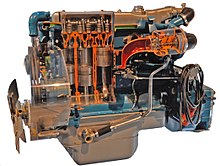Impact of Using the Wrong Engine Oil on Various Types of Automobile Engines, In this case study, we will discuss the different types of automobile engines and the type of oil they require. We will also explore the potential consequences of using the wrong type of oil in each engine.
Types of Automobile Engines and their Oil Requirements:

1. Gasoline Engines:
Gasoline engines are the most common type of engine found in cars today. These engines typically require a multi-grade oil, such as 5W-30 or 10W-30. This type of oil provides both cold-start protection and high-temperature viscosity stability, making it ideal for gasoline engines.
2. Diesel Engines:
Diesel engines operate at higher temperatures and pressures than gasoline engines, requiring a more robust oil. Most diesel engines require a diesel-specific oil, such as a heavy-duty diesel oil with a higher viscosity rating, such as 15W-40.
3. Hybrid Engines:
Hybrid engines combine both a gasoline engine and an electric motor. These engines typically require a specific oil formulated for hybrid vehicles, which provides both conventional engine protection and compatibility with the electric motor components.
READ ALSO :Pi Network: Future And King of Cryptocurrency 1
Effects And Impact of Using the Wrong Engine Oil

1. Gasoline Engines: Impact of Using the Wrong Engine Oil
A gasoline engine supplies a mixture of air and fuel (gasoline) into cylinders, produces combustion, and obtains power from the thermal energy generated by combustion. The fuel injection system measures the amount of air intake into the engine and supplies the amount of fuel required for combustion.
Also A petrol engine is an internal combustion engine designed to run on petrol. Petrol engines can often be adapted to also run on fuels such as liquefied petroleum gas and ethanol blends. Most petrol engines use spark ignition, unlike diesel engines which typically use compression ignition
If the wrong type of oil is used in a gasoline engine, the engine may experience reduced lubrication, leading to increased friction and wear on engine components. This can result in reduced engine performance, increased fuel consumption, and potentially engine failure.

2. Diesel Engines: Impact of Using the Wrong Engine Oil
The diesel engine is an intermittent-combustion piston-cylinder device. It operates on either a two-stroke or four-stroke cycle (see figure); however, unlike the spark-ignition gasoline engine, the diesel engine induces only air into the combustion chamber on its intake stroke.
Also The diesel engine, named after Rudolf Diesel, is an internal combustion engine in which ignition of the fuel is caused by the elevated temperature of the air in the cylinder due to mechanical compression; thus, the diesel engine is called a compression-ignition engine,
Using the wrong oil in a diesel engine can lead to poor lubrication, increased wear on engine components, and reduced engine performance. It can also result in increased oil consumption and potentially cause damage to the fuel injection system.
READ ALSO :Maintaining Your Vehicle Engine To last Longer 101 best way

3. Hybrid Engines: Impact of Using the Wrong Engine Oil
Hybrid electric vehicles are powered by an internal combustion engine and one or more electric motors, which uses energy stored in batteries. A hybrid electric vehicle cannot be plugged in to charge the battery. Instead, the battery is charged through regenerative braking and by the internal combustion engine.
Also A hybrid vehicle is one that uses two or more distinct types of power, such as submarines that use diesel when surfaced and batteries when submerged. Other means to store energy include pressurized fluid in hydraulic hybrids.
Misusing oil in a hybrid engine can cause damage to the electric motor components, such as the battery or electric motor. It can also impact the overall performance and efficiency of the vehicle, leading to increased maintenance costs and reduced fuel economy.
Significant Consequences of Using the Wrong Oil in Automobile Engines:
1. Poor Lubrication: Using the wrong type of oil in an automobile engine can result in poor lubrication of engine components. This can lead to increased friction and wear on internal parts, reducing the engine’s efficiency and performance.
2. Increased Engine Wear: Incorrect oil viscosity or formulation can cause accelerated wear on critical engine components such as piston rings, bearings, and camshafts. This can result in premature engine failure and costly repairs.
3. Engine Overheating: Using oil with the wrong viscosity rating can impede the engine’s ability to dissipate heat, leading to increased operating temperatures. Engine overheating can cause damage to critical components and reduce engine efficiency.
4. Reduced Fuel Efficiency: Incorrect oil can lead to increased friction within the engine, causing it to work harder to produce the same amount of power. This can result in reduced fuel efficiency and increased fuel consumption.
5. Damage to Seals and Gaskets: Using the wrong oil can cause degradation of seals and gaskets within the engine. This can lead to oil leaks, loss of oil pressure, and potential damage to other engine components.
Remedies for Using the Wrong Oil in Automobile Engines:
1. Drain and Replace Oil: If the wrong oil has been used in an automobile engine, the first step is to drain the incorrect oil and replace it with the appropriate oil recommended by the manufacturer.
2. Engine Flush: In cases where the wrong oil has been used for an extended period, an engine flush may be necessary to remove any residual contaminants and ensure proper lubrication for engine components.
3. Inspect for Damage: It is important to inspect the engine for any signs of damage that may have occurred as a result of using the wrong oil. This includes checking for unusual wear on components and addressing any leaks that may have developed.
4. Monitor Performance: After correcting the oil mistake, it is essential to monitor the engine’s performance closely. Keep an eye out for any unusual noises, vibrations, or changes in fuel efficiency that may indicate ongoing issues.
5. Regular Maintenance: To prevent future oil-related problems, adhere to the manufacturer’s recommended oil change intervals and use the correct oil type and viscosity for your specific engine.
By following these remedies and taking proper care of your automobile engine, you can minimize the risks and consequences of using the wrong oil, ensuring optimal performance and longevity of your vehicle.
Conclusion: Impact of Using the Wrong Engine Oil
In conclusion, using the wrong type of oil in an automobile engine can have significant consequences on engine performance and longevity. It is important to follow the manufacturer’s recommendations for oil type and viscosity to ensure optimal engine performance and to prevent potential damage..












